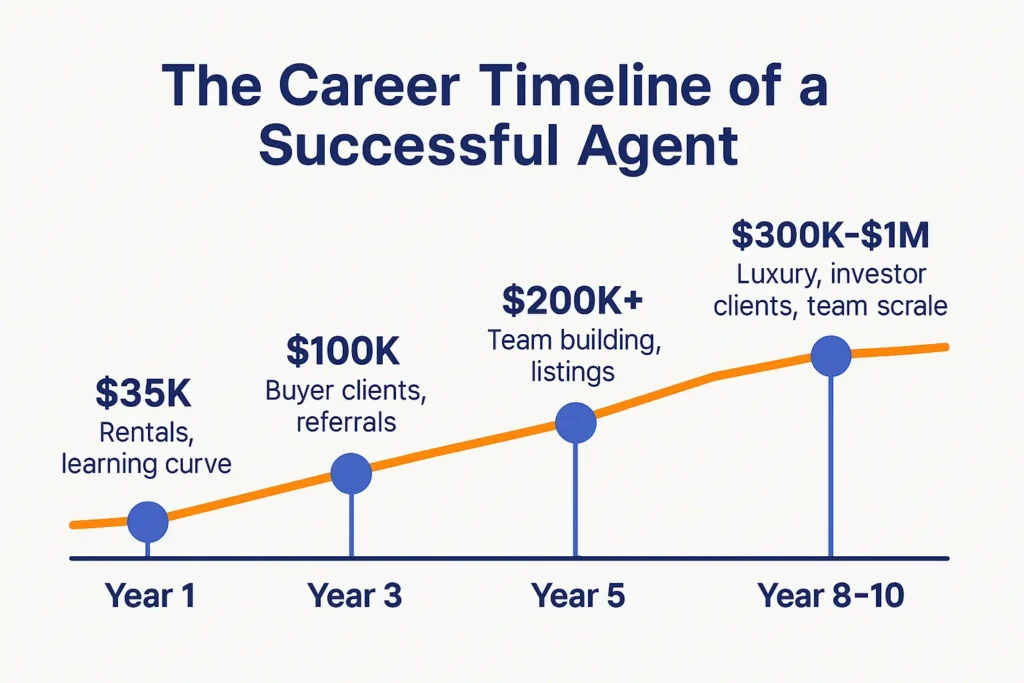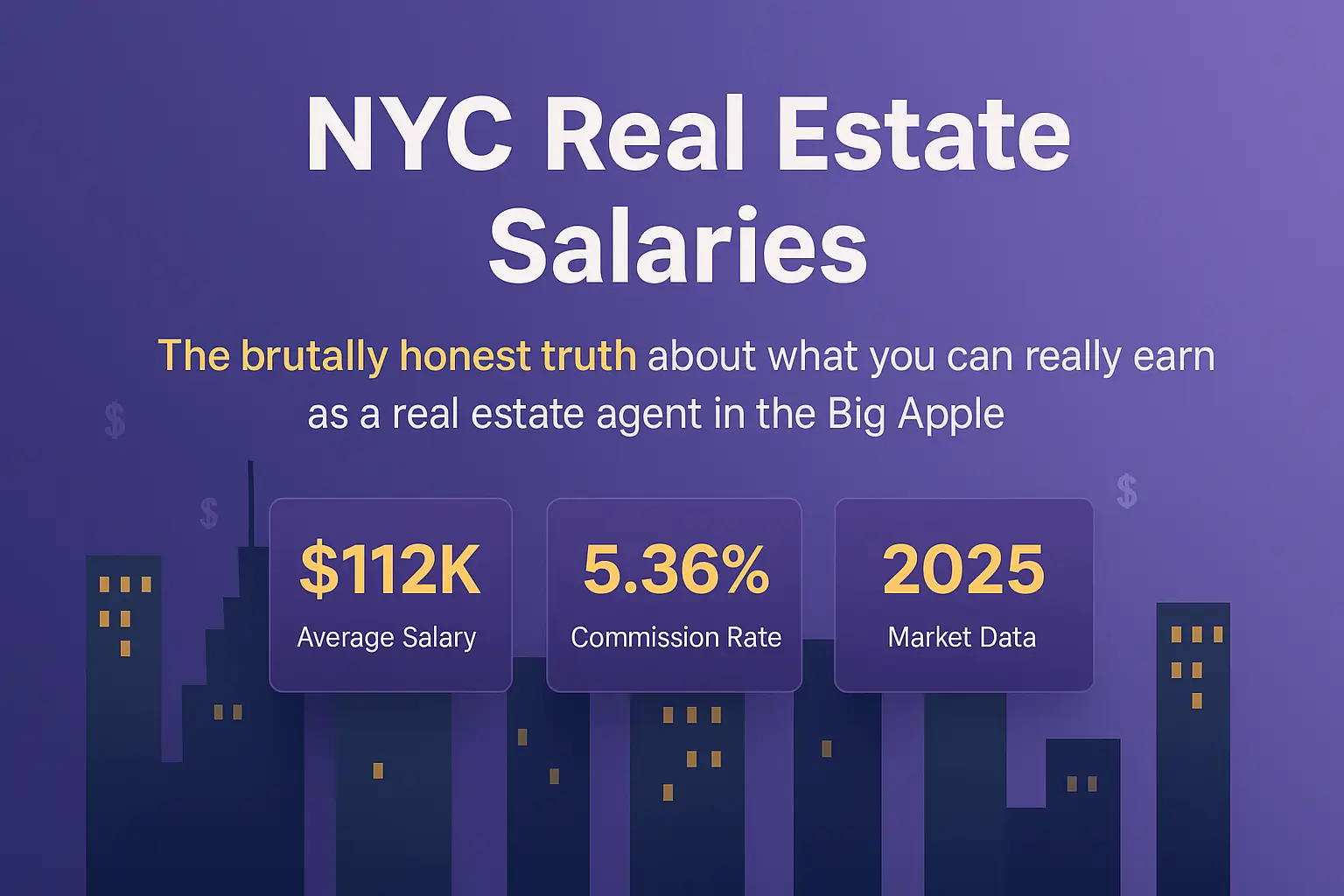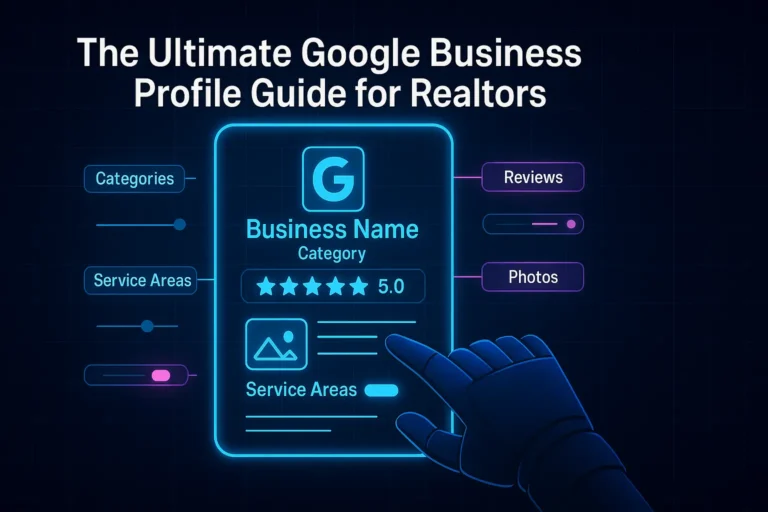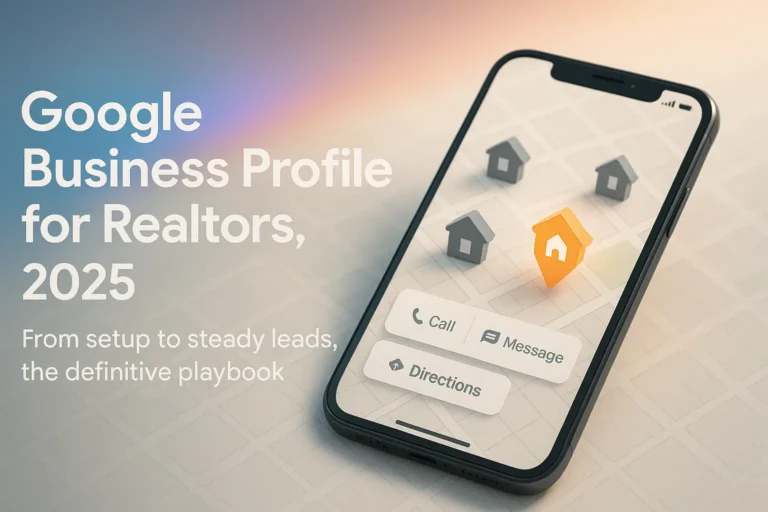Average Real Estate Agent Salary NYC (2025): The Brutally Honest Truth
Last updated: August, 2025
What they don’t tell you before you get your license
In 2025, the average real estate agent salary NYC agents report is ~$95K–$112K depending on source (BLS, Indeed, ZipRecruiter). First-year agents typically earn $25K–$45K before taxes. Actual take-home varies by commission splits, deal mix (rentals vs sales), and business expenses.
⚡ In a rush? Here’s the 30-second summary:
- 📉 87% of new NYC agents fail within 5 years due to high costs and fierce competition.
- 🧭 The blog reveals proven strategies like geographic specialization and the rental-to-sales pipeline to build a profitable career.
- 📋 Includes a realistic first-year income breakdown, commission math, and a 90-day starter plan.
💡 Success is possible – if you treat this like a business, not a fantasy.
Wondering what the average real estate agent salary NYC looks like in 2025? You’re not alone.
Picture this: You’re scrolling through Instagram, watching yet another real estate agent post about their “six-figure month” with a backdrop of Manhattan’s skyline. The lifestyle looks incredible: flexible schedule, unlimited earning potential, designer suits, and those coveted apartment keys to million-dollar penthouses.
But here’s what that glossy social media feed doesn’t show you: The 3 AM anxiety about making rent, the months without a single closing, or the soul-crushing rejection after spending weeks nurturing a lead only to lose them to another agent.
If you’re considering a career in NYC real estate, you deserve the whole truth, not just the highlight reel. This comprehensive guide breaks down exactly what you can expect to earn, the hidden costs nobody talks about, and the strategies that separate struggling agents from those genuinely building wealth in the Big Apple.
Average Real Estate Agent Salary in NYC (2025): The Real Numbers
NYC Real Estate Agent Salary by Borough
| Borough | Average Salary (2025) | Source / Last update |
|---|---|---|
| Manhattan | $94,683 | ZipRecruiter – Jul 2025 |
| Brooklyn | $100,247 | Indeed – 17 Jun 2025 |
| Queens | $97,680 | Indeed – 23 Jun 2025 |
| Bronx | $87,190 | Indeed – 17 Jun 2025 |
| Staten Island | $120,184 | Indeed – 28 May 2025 |
The data is genuinely encouraging for those who make it. According to the Bureau of Labor Statistics, real estate agents in New York earn a mean wage of $112,080 annually. That’s $53.89 per hour if you want to think about it that way (though hourly calculations are somewhat meaningless in commission-based work).
| Band | Annual | Per Month | Approx. Per Hour* |
|---|---|---|---|
| Median range (sources) | $95,000 to $112,080 | $7,917 to $9,340 | $45.67 to $53.89 |
| First year typical | $25,000 to $45,000 | $2,083 to $3,750 | $12.02 to $21.63 |
Indeed.com reports NYC agents averaging $106,012 per year, while ZipRecruiter shows $106,696 annually. These figures place NYC real estate agents well above national averages and most other professions requiring similar educational requirements.
NYC Real Estate Agent Income by Experience (2025)
| Experience | Typical Annual Gross | Notes |
|---|---|---|
| 0 to 1 year | $25,000 to $45,000 | 3 to 6 months to first closing; uneven months |
| 2 to 3 years | $75,000 to $150,000 | Growing referrals; better splits |
| 4 to 7 years | $120,000 to $250,000 | Listings momentum; small team leverage |
| 8 years plus / top producers | $250,000 to $500,000+ | Luxury, teams, high split or cap |
The Reality Check
Here’s where it gets complicated. Those averages include agents who’ve been in the business for decades, have extensive networks, and consistently work with high-value properties. They also include agents earning $30,000 per year and those pulling in $500,000+.
The uncomfortable truth: 87% of new real estate agents fail within their first five years. In NYC, where the cost of living is astronomical and competition is fierce, that percentage might be even higher.

First-Year NYC Real Estate Agent Salary: What to Expect
Most new agents in NYC earn between $25,000 to $45,000 in their first year. Yes, you read that correctly. While the potential for six-figure earnings exists, it typically takes 2 to 3 years to build the client base and market knowledge necessary for consistent high earnings.
During your first year, expect:
- 3 to 6 months before your first closing
- Inconsistent monthly income (some months $0, others $8,000+)
- High stress about covering basic living expenses
- Substantial out-of-pocket marketing and business expenses
Commission Splits to Take-Home: NYC Example Math
Understanding NYC Commission Structure
In New York, total real estate commissions average 5.36% of the sale price, split between listing and buyer agents. Here’s how it breaks down:
- Listing agents: 2.78% average
- Buyer agents: 2.58% average
But you don’t keep all of that. Your brokerage takes their cut, which varies dramatically:
New Agent Splits (typical):
- 50/50 split at many large brokerages
- 60/40 split at some boutique firms
- Plus desk fees, transaction fees, and marketing costs
Experienced Agent Splits:
- 70/30 to 85/15 splits for top producers
- Some pay flat monthly fees instead of percentage splits
- Luxury specialists may negotiate 90/10 splits
Real Commission Examples
💰 Commission Calculator
Let’s make this concrete with actual NYC price points:
Scenario 1: $650,000 Brooklyn Condo
- Total commission: $34,840
- Your share (2.58% as buyer agent): $16,770
- After 60/40 brokerage split: $10,062
- After taxes and expenses: ~$7,500 take-home
Scenario 2: $1.2M Manhattan Co-op
- Total commission: $64,320
- Your share (2.78% as listing agent): $33,360
- After 70/30 brokerage split: $23,352
- After taxes and expenses: ~$17,500 take-home
Scenario 3: $3M Luxury Property
- Total commission: $160,800
- Your share: $80,400
- After 80/20 split: $64,320
- After taxes and expenses: ~$45,000 take-home
The Hidden Costs Nobody Talks About
Upfront Investment Required
Before earning your first dollar, expect to invest:
- Licensing and education: $500 to $1,200
- MLS access and association dues: $1,500 to $2,500 annually
- Professional photography and marketing materials: $2,000 to $5,000
- Business insurance and legal setup: $1,000 to $2,000
- Initial marketing budget: $3,000 to $10,000
- Professional wardrobe: $2,000 to $5,000 (appearance matters in NYC)
Total first-year investment: $10,000 to $25,000 before earning anything.
Ongoing Monthly Expenses
Successful NYC agents typically spend $1,500 to $4,000 monthly on:
- Desk fees and brokerage costs
- Marketing and advertising
- Transportation (Uber, subway, parking)
- Client entertainment and networking
- Professional development and continuing education
- Technology and software subscriptions
The Strategies That Actually Work
1. Geographic Specialization (The Neighborhood Expert)
Instead of trying to cover all of NYC, successful agents become the undisputed expert in 2 to 3 neighborhoods. This strategy works because:
- Clients trust specialists over generalists
- You can spot undervalued properties and market trends
- Local networks and referrals develop naturally
- You become the “go-to” agent for that area
Success story: Sarah Martinez focused exclusively on Astoria, Queens. Year 1: $38,000. Year 3: $145,000. Year 5: $280,000. She’s now the top agent in her neighborhood and has a waiting list of clients.
2. The Rental-to-Sales Pipeline
Many successful NYC agents start by building their business through rentals, then convert those renters into buyers. Here’s why this works:
- Faster transaction cycles (30 to 45 days vs. 60 to 90 for sales)
- Lower stakes = less stressful client relationships
- Builds experience with contracts and negotiations
- Creates future buyer leads organically
The math: Rental commissions in NYC average $2,000 to $6,000 per transaction. A busy rental agent might close 40 to 60 deals annually, earning $80,000 to $300,000 while building relationships for future sales.
3. The Team Approach
Top-producing agents often build teams, allowing them to handle more transactions and provide better service. Team structures include:
- Lead agents who focus on listings and client relationships
- Buyer specialists who handle showings and buyer clients
- Administrative support for paperwork and coordination
- Marketing specialists for social media and advertising
Successful team leaders can earn $300,000 to $1M+ annually while providing team members with steady income and learning opportunities.
Market Dynamics: What’s Happening Now
March 2024 commission shake-up: A $418 million antitrust settlement forced the National Association of Realtors to ban listing agents from posting buyer-agent splits in the MLS. Now, every buyer must sign a written agreement that spells out exactly what they’ll owe their agent before they tour a home.
2025 NYC Market Conditions
The current NYC market presents both opportunities and challenges:
Opportunities:
- Only 1.26 months of housing inventory (strong seller’s market)
- Home values up 12.73% year-over-year
- Properties selling at 100% of listing price on average
- High demand from both domestic and international buyers
Challenges:
- Intense competition among agents
- Rising interest rates affecting buyer purchasing power
- New regulations around commission transparency
- Economic uncertainty affecting luxury market
Emerging Opportunities
Smart agents are positioning themselves for these trends:
- Climate migration: Helping climate refugees relocate to NYC
- Remote work arbitrage: Assisting people trading up from smaller cities
- Luxury rental market: High-end renters who may become buyers
- International investment: Foreign buyers seeking US real estate
The Personality Traits That Predict Success
What Successful NYC Agents Have in Common
After interviewing dozens of top-performing NYC agents, these traits consistently emerge:
Resilience: The ability to bounce back from rejection and slow periods
Patience: Understanding that relationship-building takes time
Hustle: Willingness to work evenings, weekends, and holidays
Authenticity: Clients can spot fake enthusiasm from miles away
Systems-thinking: Successful agents are organized and process-driven
Continuous learning: Top performers constantly study market trends and improve skills
Red Flags: Signs This Career Isn’t for You
Be honest with yourself. This career might not be suitable if you:
- Need predictable monthly income
- Struggle with rejection or criticism
- Prefer working alone without client interaction
- Are uncomfortable with aggressive sales tactics (though they’re not necessary)
- Cannot handle financial stress or uncertainty
- Expect quick results without consistent effort
Getting Started: Your First 90 Days
Month 1: Foundation Building
- Complete licensing requirements
- Choose and join a brokerage
- Set up business systems (CRM, accounting, marketing)
- Begin networking and relationship building
- Study your target neighborhoods intensively
Month 2: Lead Generation
- Launch social media presence
- Start creating valuable content (market updates, neighborhood guides)
- Attend networking events and open houses
- Begin prospecting (calling expired listings, FSBOs, etc.)
- Offer to assist experienced agents with their overflow
Month 3: First Transactions
- Focus on converting warm leads
- Continue aggressive prospecting
- Provide exceptional service to build referral base
- Track all activities and results
- Adjust strategies based on what’s working
Advanced Strategies for Experienced Agents
Luxury Market Entry
Breaking into NYC’s luxury market requires:
- Perfect professional presentation (wardrobe, materials, knowledge)
- High-net-worth networking (charity events, exclusive clubs, luxury service providers)
- Specialized knowledge (co-op board processes, luxury amenities, tax implications)
- Proven track record with successful sales and client testimonials
Technology Leverage
Modern successful agents use:
- CRM systems for relationship management
- Social media automation for consistent content
- Virtual staging and tours for marketing efficiency
- Data analytics for pricing and market analysis
- AI tools for lead generation and qualification
Building Multiple Revenue Streams
Top agents diversify income through:
- Traditional sales commissions
- Rental transactions
- Property management services
- Real estate investment consulting
- Speaking and training other agents
- Affiliate marketing (mortgage, insurance, moving services)
Frequently Asked Questions
How long does it take to make good money as a NYC real estate agent?
Most successful agents report it takes 18 to 36 months to build consistent six-figure income. The first 6 to 12 months are typically the hardest, with many agents earning $25,000 to $45,000. By year 2 to 3, those who persist and apply effective strategies often see $75,000 to $150,000 annually.
What’s the minimum amount I need to survive my first year?
Plan for $15,000 to $25,000 in business expenses plus your living costs. In NYC, this means having $40,000 to $60,000 saved or alternative income sources for your first year. Many successful agents keep part-time jobs or have spouse income during the transition period.
Which NYC boroughs are best for new agents?
Brooklyn and Queens offer the best opportunities for new agents due to:
- More reasonable price points for first-time buyers
- Growing neighborhoods with development opportunities
- Less competition from established luxury agents
- Strong rental markets for building experience
Manhattan requires more experience and connections, while the Bronx and Staten Island have smaller markets but less competition.
Do I need to work with a big-name brokerage?
Not necessarily. Consider these factors:
- Large brokerages offer brand recognition, training, and lead generation but take higher commission splits
- Boutique firms provide more personal attention and higher splits but fewer resources
- Discount brokerages offer the highest splits but minimal support
Choose based on your experience level, support needs, and target market.
How much should I spend on marketing as a new agent?
Budget 10 to 15% of your expected gross commission income for marketing. For new agents expecting $60,000 in first-year commissions, that’s $6,000 to $9,000 annually, or $500 to $750 monthly. Focus on:
- Professional photography and materials
- Social media advertising
- Networking events and client entertainment
- Educational content creation
Is it worth getting a real estate license if I only want to do it part-time?
Part-time real estate work in NYC is extremely challenging due to:
- Client expectation for immediate response
- Complex transaction management requirements
- Competitive market dynamics
- Time needed for relationship building
However, it can work for specific niches like luxury rentals or if you have existing networks. Most successful part-time agents are either transitioning to full-time or have unique circumstances (existing business connections, spouse in the industry, etc.).
What certifications or designations should I pursue?
Start with these valuable designations:
- ABR (Accredited Buyer’s Representative): Essential for buyer agents
- CRS (Certified Residential Specialist): Valuable for overall credibility
- SRES (Seniors Real Estate Specialist): Growing market segment
- CIPS (Certified International Property Specialist): Valuable in NYC’s international market
Wait until you have some experience and transaction volume before investing in expensive designations.
How do I compete with agents who have decades of experience?
New agents can compete by:
- Superior responsiveness: Answer calls/texts immediately
- Technology adoption: Use modern tools older agents might avoid
- Energy and availability: Work harder during evenings and weekends
- Fresh marketing approaches: Leverage social media and digital marketing
- Niche specialization: Become the expert in specific areas older agents ignore
- Exceptional service: Exceed expectations at every touchpoint
What are the biggest mistakes new NYC agents make?
Common failure patterns include:
- Underestimating startup costs and running out of money
- Trying to cover too much territory instead of specializing
- Focusing on transaction volume over relationship building
- Neglecting follow-up with past clients and leads
- Inconsistent marketing and prospecting efforts
- Joining the wrong brokerage for their needs and experience level
- Giving up too early during the inevitable slow periods
How has the market changed since COVID, and what does that mean for new agents?
Post-COVID changes include:
- Increased remote work driving demand for larger spaces
- Shifting neighborhood preferences as people prioritize outdoor space
- Technology acceleration in virtual tours and digital transactions
- Interest rate sensitivity affecting buyer behavior
- Inventory shortages in many desirable areas
New agents should focus on understanding these trends and positioning themselves as experts in post-pandemic housing needs.
The path to success in NYC real estate isn’t easy, but for those who approach it strategically, persist through the challenges, and focus on providing genuine value to clients, the financial and personal rewards can be extraordinary. Remember: every successful agent started exactly where you are now. The difference between those who make it and those who don’t often comes down to realistic expectations, proper preparation, and the willingness to treat this as a professional business rather than a get-rich-quick scheme.







21 Comments